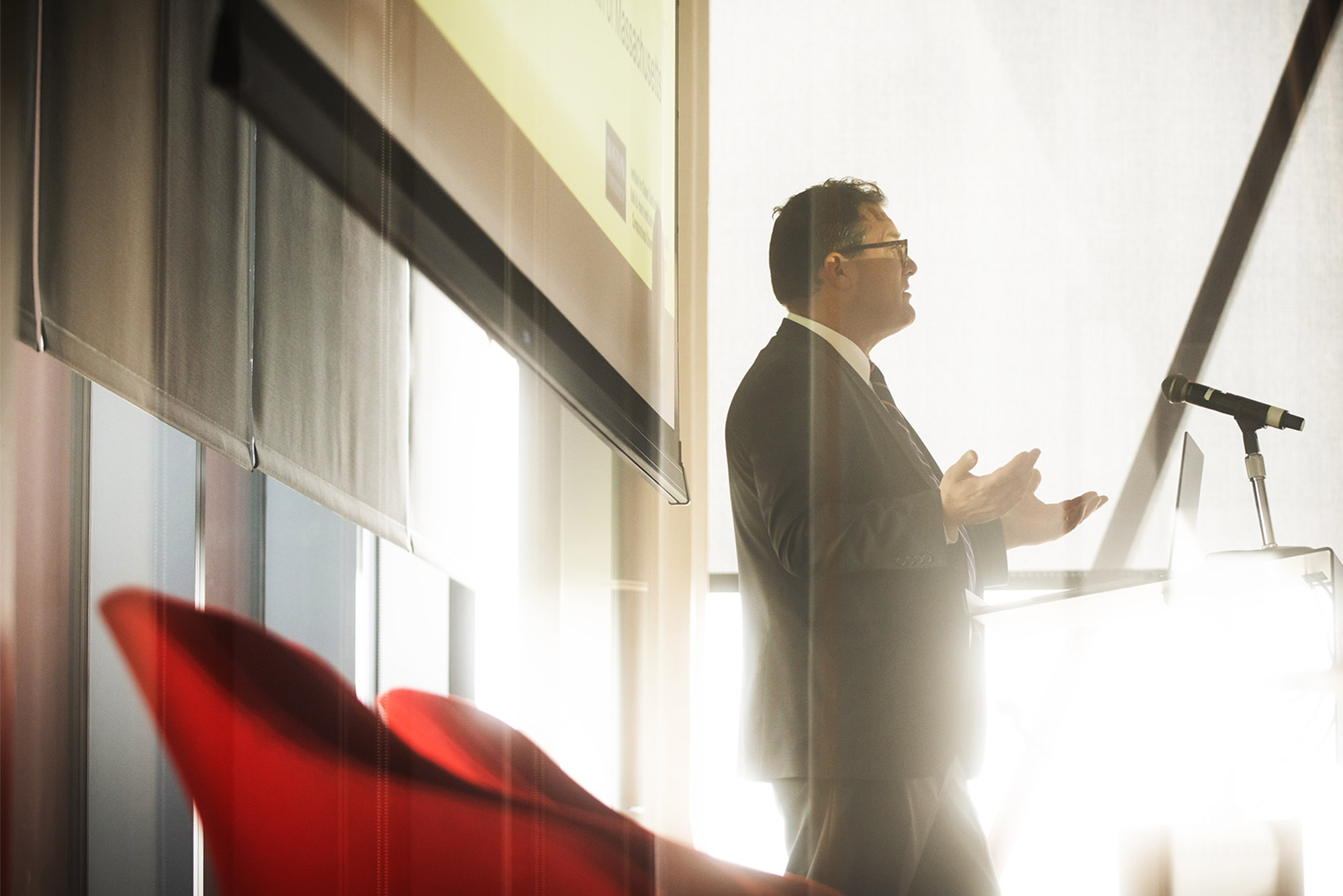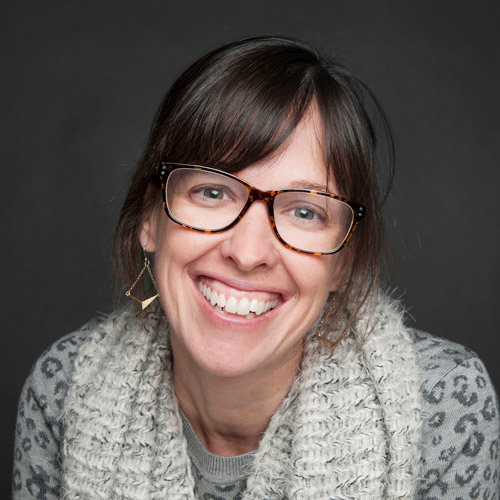Tweets, Ads, and Lies: Researchers Are Fighting against Climate Misinformation

Jonathan Schrag, Massachusetts’ deputy climate chief and director of investment for decarbonization and resilience, delivered the keynote address at the research symposium, Taking on Climate Lies.
Tweets, Ads, and Lies: Researchers Are Fighting against Climate Misinformation
Massachusetts’ deputy climate chief joins BU symposium on research aiming to track—and fight back against—climate lies
Scientists have known for decades that the continued use of fossil fuels, like gas, oil, and coal, is the primary reason for the climate crisis. Global temperatures are soaring due to excessive greenhouse gas emissions, but with urgent, systemic actions, there is still time to make a difference. But how do we ensure people get accurate and scientific information about climate change that can help save the planet? It starts with taking on climate lies.
In a yearlong project, called Data and Misinformation in an Era of Sustainability and Climate Change Crises, researchers at Boston University worked to do just that. They recently shared their findings during a full day research symposium held at the Center for Computing & Data Sciences (CDS). The event, aptly titled Taking on Climate Lies, took a deep dive into the project’s three main research areas: how climate misinformation permeates social media platforms, in particular Twitter and Reddit; misleading advertising in mainstream media; and language used to sow doubt about the urgency of climate change.
“Misinformation is pervasive, it’s at a very unique moment in our culture, and a post-truth society cannot survive,” said Benjamin Sovacool, director of BU’s Institute for Global Sustainability (IGS). “This work couldn’t be more timely.”
From the 17th floor of CDS, where the symposium took place, Boston’s skyline was on full display—a place threatened by increasing sea level rise and extreme heat. The Charles River glistened below, and the city’s famous red and white Citgo sign was visible in the distance through the glass windows behind the audience, as researchers presented findings from the project.
“We need a championing of stories,” said Jonathan Schrag, Massachusetts’ deputy climate chief and director of investment for decarbonization and resilience, who delivered the keynote address. “We need accurate information that clearly articulates where to invest.”
He also advocated for making that information easily accessible for consumers, not just to fight climate lies, but also so they can take full advantage of tax credits passed with the Inflation Reduction Act and other incentives that make decarbonizing and electrifying homes and cars more affordable.
Climate Misinformation on Twitter
One major theme throughout the symposium was the fossil fuel industry’s role in shaping the climate conversation. Irena Vodenska, a BU Metropolitan College professor of finance and IGS core faculty member, talked about fossil fuel companies starting to spread false climate information decades ago. Like when Exxon’s own scientists reportedly found that burning fossil fuels would cause catastrophic climate change, disrupt ecosystems, and lead to planetary warming and changes in weather patterns, but the company instead promoted information saying the opposite.
Vodenska and a cross-disciplinary team of BU researchers shared their efforts to examine climate mis- and disinformation on Twitter and Reddit, a tactic that became part of the fossil fuel industry’s communication strategy. They analyzed over 22,000 tweets that spread climate disinformation, and identified over 60 Twitter accounts funded by ExxonMobil—the world’s largest publicly traded oil and gas company—that promote false and misleading information about the climate crisis.

By further analyzing the tweets, they surfaced two major recurring themes from the ExxonMobil–linked accounts: “climate change is not threatening,” and “Biden’s energy plans hurt economic growth.” On Reddit, the researchers analyzed content on three subreddit forums, /r/climate, /r/climatechange, and /r/climateskeptics, posted from 2008 to present day. Misinformation was present in all three groups (especially /r/climateskeptics), but there were more instances when skepticism about climate change was refuted or challenged in the science-focused groups, /r/climate and/r/climatechange.
“Climate change should not be a political issue,” said Vodenska. “It’s an issue that impacts the place we all live, whether you’re Democrat or Republican.”
The team is aiming to use their language processing techniques to study misinformation across other subject areas, and hope that their tools can eventually help make fact-checking and flagging information on social media platforms more accurate.
“A big takeaway for me is that there’s a small, but loud number of voices that are putting out climate misinformation,” says Rebecca Pearl-Martinez, executive director of IGS. “They’re networked and working together, so how do we disentangle that, and how do we promote science as a way forward?”
Separating Truth from Lies
Alongside social media, one of the most effective ways climate lies spread is through native advertising—a type of paid content that looks deceivingly like real news articles. Michelle Amazeen, a BU College of Communication associate professor of mass communication, advertising, and public relations, and Chris Wells, a COM associate professor of emerging media studies and core faculty in IGS, identified the news publications that run the most native advertisements and the companies that pay for them.
“It’s a form of camouflage,” Amazeen says. They looked at the top 50 English-language news organizations by web traffic in the US and found that 26 have published native advertising. Those included the New York Times, Washington Post, Wall Street Journal, USA Today, CNN, and the HuffPost. A single native advertising article can cost over $500,000, making it an extremely enticing revenue stream for media organizations that have notoriously struggled financially since the early 2000s.
The researchers showed dozens of native advertisements paid for by companies like Chevron, the American Petroleum Institute, and Energias de Portugal. A notable example came from the New York Times, with the headline, “The Future of Energy? It May Come From Where You Least Expect,” paid for by ExxonMobil. The ad was used in the lawsuit brought against Exxon by Massachusetts Governor Maura Healey, who as attorney general sued the company for deceptive advertising to consumers and for misleading investors about the risks posed by climate change, including systemic financial risk.
Amazeen and Wells have found that disclaimers—like “Paid Post”—do little to alert readers. They explained that these types of ads misrepresent the full extent to which fossil fuel companies are responsible for climate change—often touting their efforts to be “green” and “sustainable,” without acknowledging that those efforts make up a tiny fraction of their business, or that they’re causing the damage in the first place.
Amazeen and Arunima Krishna, a COM assistant professor of mass communication, advertising, and public relations, also shared how all these types of climate misinformation influence people’s beliefs. In 2021, Krishna surveyed 645 Americans about their views on climate change, categorizing the public into four groups: disinformation immune, disinformation vulnerable, disinformation receptive, and disinformation amplifying—the smallest group, who hold extremely negative attitudes about climate change, doubt humans’ role in accelerating it, and are motivated to spread the disinformation they believe.
According to Krishna, having these categories can lead to better targeted information campaigns that can more effectively educate people about the realities of climate change. She told the symposium audience that, based on the research, before engaging with or trying to influence someone who is vulnerable or has accepted false information about climate change, or any topic, it’s imperative to first understand the other person’s perspective.
“Despite the issues, social media is an incredibly dialogic platform,” Krishna says. “I think that we need to remember that, and go back to the roots of social media, which emerged as a way to encourage dialogue among people who can’t otherwise interact.”
The next step for researchers is to test different correction strategies—like how and where a paid post is labeled on social media platforms, or where and when to repudiate fake news. IGS also has plans to further investigate corporate environmental, social, and governance investments by improving ways of measuring impacts and metrics to see if companies are following through on their commitments.
To cap the day, BU leaders—including deans from COM, MET, and the College of Engineering—took part in a panel discussion to share their perspectives on the University’s leadership on climate solutions. Ioannis Paschalidis, director of Rafik B. Hariri Institute for Computing and Computational Science & Engineering, and Gloria S. Waters, BU vice president and associate provost for research, talked about different initiatives and research opportunities. Mariette DiChristina, dean of COM, talked about the college’s collaborations, such as one with the Civic Science Fellows program.
“We have to create defenses,” Sovacool said after the day’s events. “And that starts with projects like this.”
This research was jointly funded by IGS and the Hariri Institute.


Comments & Discussion
Boston University moderates comments to facilitate an informed, substantive, civil conversation. Abusive, profane, self-promotional, misleading, incoherent or off-topic comments will be rejected. Moderators are staffed during regular business hours (EST) and can only accept comments written in English. Statistics or facts must include a citation or a link to the citation.